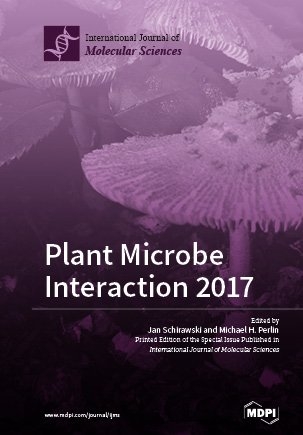
Plant Microbe Interaction 2017
Seiten
2018
MDPI (Verlag)
978-3-03897-328-7 (ISBN)
MDPI (Verlag)
978-3-03897-328-7 (ISBN)
- Keine Verlagsinformationen verfügbar
- Artikel merken
ca. 200 words; this text will present the book in all promotional forms (e.g. flyers). Please describe the book in straightforward and consumer-friendly terms.
[Plants interact with microbes in many different ways and on many different levels. The most obvious interaction results in plant disease, which can be a severe threat to the global food supply. Therefore, research strives to uncover the mechanisms of host plant invasion, learn about the weapons used by pathogenic microbes, and understand the defense strategies of the affected plants. On the other hand, many interactions with the plant are indeed beneficial for the plant, increasing its ability to recruit limiting nutrients from the soil, preventing the growth of more detrimental microbes, or making the plant more resistant to abiotic stresses. Plants also serve as habitats for microbes that may colonize apoplastic spaces within leaves, may live on plant surfaces, or may prosper in the immediate vicinity of plant organs (e.g., in the rhizosoil). In this book, one editorial, two review articles, and twelve original research articles highlight the newest research endeavors on plants interacting with beneficial microbes, having to cope with detrimental microbes, or hosting complete microbiomes. Together, these articles contribute to the knowledge essential for the development of strategies that will prepare our plants to withstand the increasingly harsh conditions they will be exposed to in the coming years of climate change.]
[Plants interact with microbes in many different ways and on many different levels. The most obvious interaction results in plant disease, which can be a severe threat to the global food supply. Therefore, research strives to uncover the mechanisms of host plant invasion, learn about the weapons used by pathogenic microbes, and understand the defense strategies of the affected plants. On the other hand, many interactions with the plant are indeed beneficial for the plant, increasing its ability to recruit limiting nutrients from the soil, preventing the growth of more detrimental microbes, or making the plant more resistant to abiotic stresses. Plants also serve as habitats for microbes that may colonize apoplastic spaces within leaves, may live on plant surfaces, or may prosper in the immediate vicinity of plant organs (e.g., in the rhizosoil). In this book, one editorial, two review articles, and twelve original research articles highlight the newest research endeavors on plants interacting with beneficial microbes, having to cope with detrimental microbes, or hosting complete microbiomes. Together, these articles contribute to the knowledge essential for the development of strategies that will prepare our plants to withstand the increasingly harsh conditions they will be exposed to in the coming years of climate change.]
Microbial Genetics, Institute of Applied Microbiology, RWTH Aachen University
Department of Biology, Program on Disease Resistance, University of Louisville, Louisville, KY 40292, USA
| Erscheinungsdatum | 04.11.2018 |
|---|---|
| Mitarbeit |
Gast Herausgeber: Jan Schirawski, Michael H. Perlin |
| Verlagsort | Basel |
| Sprache | englisch |
| Maße | 170 x 244 mm |
| Themenwelt | Kunst / Musik / Theater |
| Naturwissenschaften ► Biologie ► Allgemeines / Lexika | |
| Naturwissenschaften ► Biologie ► Botanik | |
| Schlagworte | plant-associated microbiomes • plant growth-promoting bacteria • plant-pathogen interaction |
| ISBN-10 | 3-03897-328-9 / 3038973289 |
| ISBN-13 | 978-3-03897-328-7 / 9783038973287 |
| Zustand | Neuware |
| Haben Sie eine Frage zum Produkt? |
Mehr entdecken
aus dem Bereich
aus dem Bereich
Über hybride Mineralien, Tiere, Pflanzen, Pilze ...
Buch | Hardcover (2023)
Matthes & Seitz (Verlag)
CHF 39,20
Band 2: Elektrizität, Optik und Wellen
Buch | Softcover (2022)
Wiley-VCH (Verlag)
CHF 55,85
Berufsbilder von und für Biologen und Biowissenschaftler
Buch | Softcover (2024)
Verband Biologie, Biowiss. u. Biomedizin in Dtl. e.V. (Verlag)
CHF 23,50


